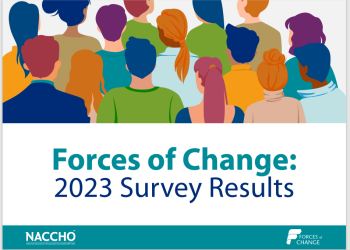
Photo by Alyson Jordan
By Jack Herrmann, MSEd., NCC, LMHC, Senior Advisor & Chief, Public Health Programs, NACCHO
The public health workforce often conducts its work behind the scenes, making the citizens of their communities healthier and safer without them even being aware of it. It is not until disaster strikes that people find out the value of their public health department. Every day local health departments are planning for untoward incidents that pose threats and vulnerabilities to those living in communities across the country. Bioterrorism attacks, foodborne outbreaks, crippling ice storms, and devastating tornadoes, to name a few. Those of us who live and work in the field of public health and healthcare preparedness live by the mantra—Don’t Panic, Be Prepared.
Last week, over 1,600 local, state, and federal public health and healthcare professionals and other partners converged on Atlanta, Georgia for the annual Preparedness Summit. While cuts to travel and conference budgets likely kept some away, those who were in attendance were committed to absorbing as much as they could of the new research findings, training tools, and other resources that were presented in over 100 sessions and 90 posters during this year’s event. Subject matter experts provided useful information on a variety of topic areas such as community planning for the distribution and dispensing of life-saving medical countermeasures following a biological incident, addressing the sheltering needs of vulnerable and at-risk populations, setting up a community reception center in the aftermath of a radiation or nuclear event, and using digital disease detection to mitigate an influenza pandemic. Conference-goers heard strategies and tips for how to address these complex issues and were provided with tools-in-hand to take back home.
Some of the more salient points were presented in the conference’s three general sessions. During the Summit’s opening, physician and award winning journalist, Sheri Fink recounted her experiences covering the aftermath of Hurricanes Katrina and Sandy and the devastating impact those storms had on the healthcare system in the affected regions. While she and the expert panel that followed her presentation spoke about the many advances that have been made since those events, there remains considerable work left to be done to prepare the nation to face its future. CDC, ASPR, DHS, and their local and state public health partners also looked back over the last three years at the advances made in aligning the Public Health Emergency Preparedness, Hospital Preparedness, and the Homeland Security grant programs; critical programs aimed to build, strengthen, and sustain the nation’s capabilities to respond to disasters. Again, while much progress has been made in this area, sobering data suggested that continued cuts in funding to these programs are likely to result in the erosion of the progress that has been made to date; leaving communities vulnerable to the impacts of natural and human-caused disasters. And finally, the closing session of the conference had new lessons for us—the importance of considering long-term recovery activities in our initial planning efforts. Lessons learned over the past twenty years since the Oklahoma City Bombing, the attacks of September 11, 2001, Hurricanes Katrina and Rita, the Gulf Oil Spill, and last year’s Boston Bombing suggest that most of our work is limited to the initial disaster response, while failing to consider that some incidents may have rippling effects that are felt for decades after.
To an outsider, their initial impression of the Preparedness Summit might be all “doom and gloom.” To those of us who call this our profession and do this work with a sense of passion, last week’s conference was exciting, energizing, and empowering. We witnessed the hope and optimism of a dedicated public health workforce that could take pride in collective advances we’ve made over the years and the tremendous efforts that continue to be made in preparing our communities and the nation for anything that might strike. While there are numerous trials on the horizon, steadfast local health departments are poised and ready to meet those challenges. We don’t need to panic, because we’re prepared.







